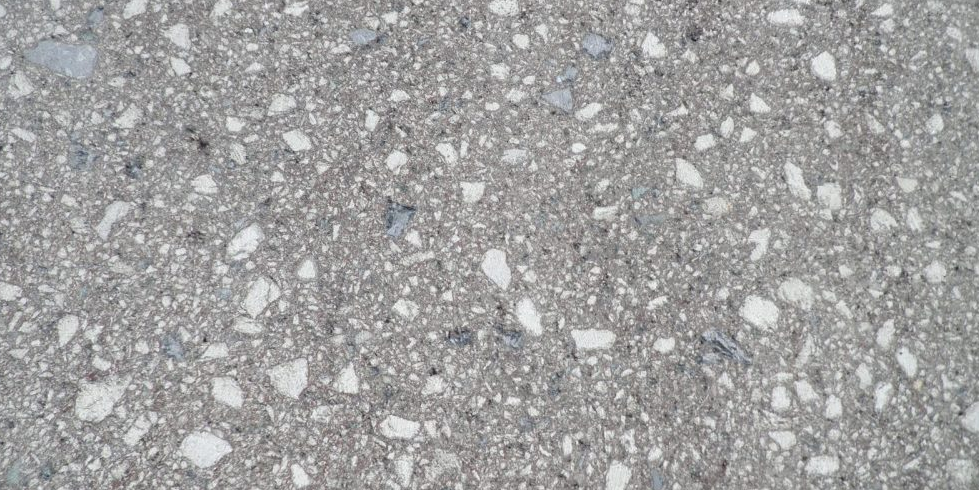Polished asphalt is a decorative variant of asphalt that combines functionality and aesthetics, making it ideal for pedestrian and urban areas. This type of asphalt stands out for its ability to transform common surfaces into visually appealing and safe areas without compromising durability or resistance to traffic.

Below, we will explore in detail what polished asphalt is, its main properties, application processes, and the environments where it is most commonly used.
What is Polished Asphalt?
Polished asphalt is a finishing technique applied to newly laid asphalt. The process involves polishing the surface of the asphalt to expose the aggregates (stones) on its visible face. This finish not only enhances the appearance of the asphalt but also provides a non-slip texture, making it ideal for pedestrian areas or decorative purposes.
This type of asphalt is customized with aggregates and pigments depending on the aesthetic needs of the project. The final result is modern, functional, and visually attractive.
Properties of Polished Asphalt
- Decorative Aesthetics
- It allows for the creation of visually appealing surfaces with personalized finishes using various colored aggregates and pigments.
- Non-slip Texture
- The exposed aggregates create a safe surface for pedestrians, even in wet conditions.
- Durability
- It retains the properties of traditional asphalt, such as resistance to wear and the ability to withstand moderate loads.
- Low Maintenance
- Requires less maintenance than other decorative pavements, thanks to its resistance to weather conditions and traffic.
Application Process of Polished Asphalt
The process for obtaining polished asphalt involves several stages that ensure a uniform and durable finish:
- Surface Preparation
- The newly laid asphalt is leveled and smoothed to remove imperfections.
- Application of Color and Aggregates
- Aggregates of the desired quality and color are selected and mixed with pigments to achieve the desired decorative finish.
- Polishing the Asphalt
- Specialized machinery is used to polish the surface, exposing the aggregates. This process ensures a uniform texture and non-slip surface.
- Sealing
- In some cases, a sealer is applied to protect the color and improve resistance to wear and stains.
Common Uses of Polished Asphalt
Polished asphalt is a versatile solution used in various urban and private environments:
- Pedestrian Areas
- Streets, plazas, and walkways where both safety and aesthetic design are important.
- Parking Lots
- Spaces where a decorative and non-slip surface enhances the user experience.
- Commercial Environments
- Shopping malls, theme parks, and recreational areas where appearance is as important as functionality.
- Sports Infrastructure
- Running tracks, bike lanes, and sports zones where a non-slip texture is crucial.
- Residential Access Areas
- Driveways and private paths that require a sophisticated and durable finish.
Advantages of Polished Asphalt
Polished asphalt offers multiple benefits that make it an attractive option for urban and decorative projects:
| Advantage | Description |
|---|---|
| Customization | Wide range of colors and textures to match the surrounding design. |
| Safety | Non-slip surface that reduces the risk of accidents. |
| Durability | Resistant to wear, pedestrian traffic, and weather conditions. |
| Reduced Maintenance | Requires less care compared to other decorative pavements. |
| Visual Impact | Enhances the overall look of any space, increasing its aesthetic value. |
Differences from Other Types of Asphalt
Unlike traditional asphalt, polished asphalt has a decorative focus, aimed at beautifying spaces without sacrificing functionality. In addition, its non-slip texture sets it apart from smooth or conventional asphalts, making it safer for pedestrians.
While pure or liquid asphalt is primarily used for functionality, such as waterproofing or repairs, polished asphalt adds an essential aesthetic element in modern urban projects.
Polished asphalt is an innovative solution that combines durability, safety, and design into one material. Ideal for urban, commercial, and residential areas, this type of asphalt transforms everyday spaces into functional and attractive areas.
Thanks to its versatility, polished asphalt continues to gain popularity as a practical and decorative alternative in modern construction, adapting to the aesthetic and functional needs of each project.






